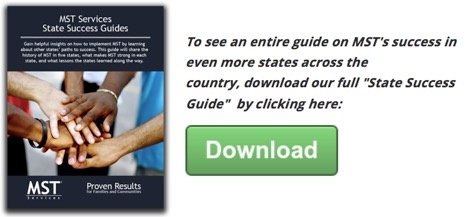How MST Came to Louisiana
Louisiana was an early adopter of Multisystemic Therapy (MST). The initial wave of research on the treatment model caught the eye of researchers in the state, who were impressed with the outcomes reported and advocated for the state to adopt the model. In 1995, the first MST team was funded through a criminal justice grant, and over the years the model grew steadily, thanks largely to strong support for MST in Louisiana from the court system.
In 2001, the Louisiana Supreme Court provided significant funding to the Jefferson Parish Health System Authority (JPHSA) to support their MST program – enough funding, in fact, to offer MST in Louisiana to every youth going through the state’s drug court system.
The state has remained a steadfast supporter of JPHSA’s MST program throughout the years, providing key funding and even helping the program restart after Hurricane Katrina disrupted their service in 2005. Today, there are over 50 MST teams in JPHSA’s network partnership, funded through a combination of Medicaid support as well as state Supreme Court funding.
Related: Learn How to Use Medicaid for MST Funding
MST Champions
Stephen Phillippi, with LSU’s Health Sciences Center, is a key champion of MST in Louisiana. His work in rewriting the standards for the youth drug court were instrumental in the growth of MST, and he continues to advocate at the state level to promote widespread use of evidence-based practices in general.
Additionally, Dr. Hussey, the Director of Louisiana’s Office of Behavioral Health, helped pioneer the original funding of MST in the state, and went above and beyond the call of duty in attending a 5-day training for MST therapists, in order to be better informed to advocate for the service at the state level.
“MST has played an integral role in the success of our clients. I feel like we have seen some deep successes in the clients we have referred over. MST therapists are always available to advocate for their clients and are always willing to help navigate difficult situations.”
- Harpreet Samra, MST Therapist
Strengths of MST in Louisiana
The success of Louisiana’s MST program can be attributed, at least in part, to the program’s effective collaboration with the state to fund and support the MST teams. Through the early years of development, the program worked with the state to find ways to bring MST to their communities – even in times of severe hardship, such as after Hurricane Katrina. Additional collaboration led to a revision of the Louisiana drug-court standards to implement a requirement for evidence-based programs as treatment offered to youth – changes that increased demand for MST across the state. In working with the court system, the Division of Child and Family Services, and the Medicaid offices to fund MST, Louisiana’s MST program demonstrates that collaboration and common commitment to the program are keys to success.

MST in Louisiana: Lessons Learned
Louisiana MST, like many other Medicaid-funded MST programs, has had to overcome the challenge of sustaining their teams while only being able to bill for a subset of all their activities and costs. Since Medicaid can only be billed for direct treatment costs, and can’t be billed for start-up costs or administrative activities, there is a challenge in getting teams up and running when they must make significant investments before being able to bill their first dollar. However, Louisiana (like many other states) has shown that this challenge is surmountable, and has proven that Medicaid can be used to finance programs. By championing the long-term outcomes of the model and clearly communicating the impact the treatment has on the lives of troubled youth, MST in Louisiana is able to create enthusiasm in providers who are willing to invest in the program, even though returns may be slightly delayed. Generating this commitment to the model, and creating a dedication to do whatever it takes to meet the needs of the youth, is critical to the development of successful MST programs.
If you know of someone that would benefit from MST or you would like to start an MST program in your area, please click here.



